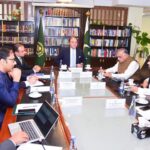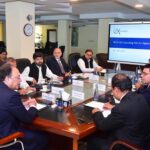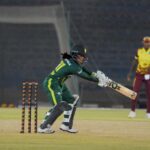NEW YORK, Oct 28 (APP): Pointing out that the situation in Indian-occupied Kashmir is “very, very turbulent”, Pakistan’s Ambassador to the United States, Masood Khan, has warned of a serious threat of escalation of tensions with India, saying that this includes the looming possibility that the two countries could turn to their strategic arsenals should a fight erupt.
“That risk is always there,” Ambassador Masood Khan told Newsweek in an interview, as Kashmiris, Pakistanis and their supporters observed “Kashmir Black Day” on Thursday.
“Pakistan and India are nuclear weapons states and the situation in the Indian Occupied Jammu and Kashmir is very, very turbulent,” he added.
The “Black Day” marks the anniversary of India’s massive invasion and occupation of Jammu and Kashmir on 27 October 1947.
That Indian aggression led to the first Indo-Pakistani war, but since then the two nations have fought three more major conflicts with even more frequent clashes occurring across the Line of Control in the disputed Kashmir region.
While ties between Islamabad and New Delhi have fluctuated over the years, Newsweek said they’ve been particularly strained since Indian Prime Minister Narendra Modi dissolved India-administered Jammu and Kashmir’s semi-autonomous status in August of 2019 and ordered a crackdown to stem three-decade of uprising.
Now, Masood Khan said the situation “is deteriorating” as he accused India of orchestrating population transfers to settle Hindus into the majority-Muslim region and of committing an array of human rights violations.
But even as the situation approached a critical point, he called for both bilateral and international mediation to improve ties with New Delhi and avoid further escalation.
“It is the responsibility of the two countries to come to a peace table to resolve outstanding issues,” the ambassador said. “But the risk is that right now there is no diplomatic contact between India and Pakistan at all, no diplomatic conduit. This is perilous.”
“The two sides should be communicating and talking,” he added, “especially because of the precarious situation in the Indian Occupied Jammu and Kashmir.”
The latest strife came from Indian Defence Minister Rajnath Singh’s explosive remarks that India’s aim is to implement the resolution passed in the Indian Parliament on February 22, 1994 and to reclaim remaining parts, such as Gilgit and Baltistan.
Masood Khan also rejected Indian allegations of Pakistan supporting militant group in occupied Kashmir, and portrayed the conflict as one of an unarmed people facing one of the world’s strongest militaries.
He accused India of having “hubris” due to “its great power status” through which India assumes “it would get away with whatever it is doing in Kashmir.”
“But this may not be true at all in the long run, as this might affect the general dynamics of Indian polity as well,” he added. “I mean, if you’re imposing injustice in the occupied territory that pattern can travel to other parts of India. That pattern had manifested in the form of persecution of Muslims and other minorities in India itself.”
With the relationship between Islamabad and New Delhi virtually frozen, Masood Khan argued that the two governments should work to find a venue to outline and resolve their issues once and for all.
“We in Pakistan, the people of Jammu and Kashmir, believe in diplomacy,” the ambassador said. “We think that the right vehicles are the United Nations or we should have peace tables in Srinagar or Muzaffarabad … or Delhi or Islamabad or a third country.”
“But the most suitable places would be New York or Geneva,” he added. “We should have talks to put this issue on the table again, and resolve it for all times to come. It can’t be swept under the carpet. This would be good for both countries and the people of Jammu and Kashmir.”
Such an effort at the U.N., he said, may finally lead to a breakthrough on Kashmir’s status.
“If it is their territory, as they claim, then go to the United Nations hold a referendum and the people of Jammu and Kashmir will decide whose territory it is. And if the people decide in their favour, then they can impose their writ,” Masood Khan said. “But if the people of Jammu and Kashmir make an alternative choice, that they would rather join Pakistan, then India should respect that verdict.”
But the ambassador also acknowledged what he saw as a lack of international focus on the issue, given the multitude of crises plaguing the geopolitical climate.
“The international community’s bandwidth about Jammu and Kashmir has shrunk because of many other factors,” Khan said, “such as the Ukraine war, and also many other international developments.”
“So, nobody’s talking, for instance, in the United Nations or around the United Nations about the resolution of the Jammu and Kashmir dispute or the right to self-determination of the people of Jammu and Kashmir, which was promised to them by the United Nations Security Council,” he added. “We must revive multilateral diplomacy to ascertain the wishes of the people of Jammu and Kashmir.”.
As India and Pakistan marked their opposing narratives over the history of October 27, the Pentagon released its Nuclear Posture Review highlighting the Biden administration’s efforts to deter adversaries with the full extent of the U.S. military’s own arsenal, the Newsweek report pointed out.
“Nuclear weapons are developed for deterrence, you deter your adversaries and enemies from attacking you, you secure yourself,” Masood Khan said. “But when you’re talking about the use of nuclear weapons, you have to demonstrate the utmost responsibility and restraint. Rhetoric about the use of nuclear weapons comes cheap, but its consequences are disastrous, catastrophic.”
In fact, Khan warned, “even if a small weapon, hypothetically speaking, was used in any theater, that would lead to a nuclear winter.”
“Just one part of the world will not be affected; it will be the entire globe,” he said. “And it would have a detrimental impact on climate change, food security or there would be a nuclear winter, but it would impact people’s health adversely.”
Masood Khan stressed the need for stronger ties between Pakistan and the US, who have a long history of partnership, both through the Cold War and the “War on Terror.” And he said it was important to define these relations beyond simply the scope of regional issues such as the rivalry with India.





